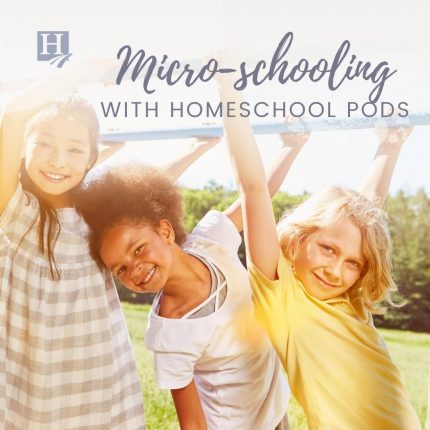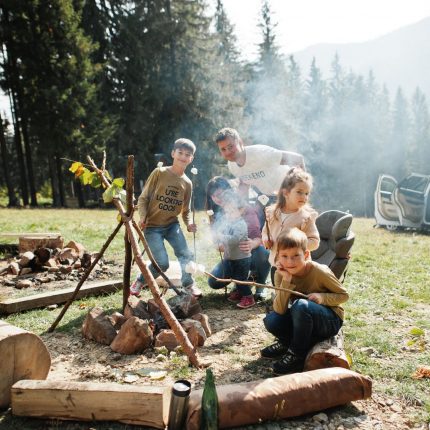
Micro-Schooling with Homeschool Pods
August 20, 2020Have you heard of homeschool pods? Perhaps this phrase has floated through your social networks and it intrigued you as an option for your family. Homeschool pods are also referred to as pandemic pods or micro-schools, so if you see those terms in passing, they are referring to the same idea.
Homeschool pods originated from the need for mainstream homeschooling due to school closures from COVID-19. Parents may have set their kids up with a homeschool program, curriculum, or remote learning option, but found bearing the isolation difficult. Truthfully, we are all feeling the isolation with this pandemic!
However, as fall back-to-school time approaches, many schools are staying closed or continuing remote learning. As a solution, parents have started connecting with homeschool groups to teach their children collectively or as a homeschool tutoring option. These groups are much smaller than a classroom, but still offer many benefits for students.
In this post, we discuss:
- What is a Homeschool Pod?
- How Do Pandemic Pods Work?
- Are Micro-Schools Legally Considered Homeschooling?
- How to Find a Homeschool Pod
What is a Homeschool Pod?
A homeschool pod is a group of homeschooled students learning cooperatively. There are many varieties of these homeschool groups currently referred to as pandemic pods. Most often, parents are withdrawing their children from the public school system, registering as homeschoolers, and then collaborating with other parents to provide curriculum and instruction to their children. Another popular choice for parents is pooling their resources to hire a certified teacher for their group.
As a result, these children learn in small homeschool pods of less than 10 students, taught by the parents or a hired teacher.
If you’re thinking these homeschool pods sound similar to co-op classes from homeschool support groups, you’re not wrong. However, homeschool group co-op classes vary from pods in that a co-op class usually teaches one course to students in the same grade. Instead, a homeschool pod is a group of multi-age students learning their coursework together, not just one course or one grade.
These pandemic pods allow students to learn at their own pace while following their interests, with sharing the responsibility among parents. Have you considered homeschool options but you’re not sure about taking on the full weight of your child’s education? Many parents feel the same. Regular homeschooling may not be right for your family, and that’s okay. Microschooling may be a good alternative as a hybrid of traditional schools and homeschooling.
Make sure you are getting involved with a legitimate homeschool pod and not a company taking advantage of the trending term. Here are a few aspects to look for in a homeschool pod:
- Informal academic settings. Most genuine homeschool pods meet in a home, office, or studio. The small learning space helps eliminate the typical classroom environment and invites creativity into academic work.
- A micro-school features small classes of only 5-10 students. Small class sizes mean more one-on-one teaching from the instructor (usually a parent or hired teacher), greater understanding, and individualized education.
- Various grades are welcomed to attend the same micro-school. Picture homeschool pods like a pioneer schoolhouse with multiple grade levels. Various ages are welcome in a micro-school since each child learns individually.
Prenda: The Original Micro-School — Another idea to consider is official Prenda micro-schools. Prenda schools began in Arizona when the founder, Kelly Smith, noticed the stark difference between a child being told to sit and learn, and children learning freely from their ambitions. He began Prenda micro-schools, which have expanded throughout Arizona and even to a few other states.
Prenda micro-schools operate as a hybrid of traditional schools and public schools. In short, these micro-schools are led by “teacher guides,” usually in a home setting, for multiple grade levels of very small class sizes, typically only 8-10 students. Prenda micro-schools use a mix of online homeschooling curriculum, cutting-edge educational technology, and traditional funding resources.
These micro-schools offer the comfort and freedom of homeschooling while relieving parents of the sometimes intimidating responsibility for their child’s education, especially if both parents work full-time.
- Children are taught by trained and certified teaching guides.
- Prenda schools are regularly expanding throughout the United States.
- Students learn core academic skills at their own pace.
- The students will make their own academic goals for the core subjects: math, reading, writing, social studies, science, etc, and are assisted in these choices by the teacher guide.
- Students will explore these goals, find the answers, and reach their objectives on their own, at their own pace, and prompted by their own interests.
- Testing is administered as required.
- Prenda micro-schools are partially or completely funded and therefore must comply with testing requirements as needed.

- Prenda micro-schools are partially or completely funded and therefore must comply with testing requirements as needed.
How Do Pandemic Pods Work?
There are several ways parents can approach microschooling. Here are four distinct options for cooperative learning with pandemic pods.
- Neighborhood schools form small schools — These micro-schools are sometimes legally considered private or charter schools.
- Parents share the teaching among themselves — Parents individually register as homeschoolers with the state but gather to share teaching responsibilities and curriculum costs.
- Parents pool resources to hire a certified teacher — Parents register as homeschoolers and then hire a teacher to instruct their micro-school class. This option is similar to homeschool tutoring.
- Enroll in a Prenda micro-school near you — Prenda micro-schools offer children a unique learning style, instructed by trained and certified learning guides.
There are several benefits of pandemic pods to consider:
- Socialization opportunities.
- Multiple grade levels make homeschool pods inclusive.
- Camaraderie for new homeschooling parents.
- The advice of experienced homeschoolers.
- Working, single, or new homeschool parents don’t have the full responsibility on their shoulders.
- Homeschool pods give public-schooled children an experience similar to their normal.
Are Micro-Schools Legally Considered Homeschooling?
With the increase of school closures, thousands of children are now learning from home. Many families have turned to homeschooling or helping their children work on assignments through distance learning. Are these families considered homeschoolers since their children are learning from home? If not, what is the difference? The terminology may seem unimportant, but it can be helpful to know your responsibilities and available resources.
Here are a few popular choices for educating your children from home:
- Public School-at-Home — Students complete work assigned by a certified teacher from a school district, private school, or virtual academy. The school is responsible for reporting to the state and keeping records. Public school-at-home can be a wonderful option for children who need the atmosphere of home to focus and the one-on-one help from the teacher.
- Is it legally considered homeschooling under state statutes?
- No.
- Who is responsible for reporting to the state?
- The school.
- What are the parent’s responsibilities?
- They are considered the “learning coach.” Parents will supervise as needed and help their children with homework.
- Is it legally considered homeschooling under state statutes?
- Registered Homeschool — When getting started with homeschooling, the difference comes down to which party is legally responsible for reporting to the state. With official homeschooling, the parent/guardian is accountable to the state for the child’s education. The benefits of homeschooling include parents having the flexibility to select curriculum, assign lessons, control the daily schedule, take vacation breaks, and more.
- Is it legally considered homeschooling under state statutes?
- Yes!
- Who is responsible for reporting to the state?
- The parents/legal guardian.
- What are the parent’s responsibilities?
- Complying with state regulations, creating and keeping records, choosing a homeschool curriculum/program, teaching lessons, grading, signing up for standardized tests when needed, and more.
- Is it legally considered homeschooling under state statutes?
-
- Unschooling — There is a homeschooling method that swings to the opposite standards of public school at home called unschooling. With unschooling, many parents avoid textbooks and standard curriculum as a whole, preferring to “life-school” as they call it. These families often look for learning opportunities in every area of daily life and let their child take the lead by learning from whatever interests them.
- Is it legally considered homeschooling under state statutes?
- Yes! (Though parents should note that certain states may not allow for unschooling by requiring portfolios, a curriculum plan, or standardized testing.)
- Who is responsible for reporting to the state?
- The parents/legal guardian.
- What are the parent’s responsibilities?
- Complying with state regulations and giving their children daily educational opportunities.
- Is it legally considered homeschooling under state statutes?
- Unschooling — There is a homeschooling method that swings to the opposite standards of public school at home called unschooling. With unschooling, many parents avoid textbooks and standard curriculum as a whole, preferring to “life-school” as they call it. These families often look for learning opportunities in every area of daily life and let their child take the lead by learning from whatever interests them.
- Microschooling — Micro-schools can vary. Microschooling usually falls within one of two overarching categories: (1) part of private/charter schools or (2) co-op learning with responsibilities shared among parents. A third sub-option involves parents registering as homeschoolers, but pooling resources to hire a certified teacher for 10 or fewer children.
-
- Is it legally considered homeschooling under state statutes?
- Yes.
- However, if your child “enrolls” in a private/charter school as the micro-school, it would not legally be considered homeschooling.
- Yes.
- Who is responsible for reporting to the state?
- The parents.
- However, if the micro-school is officially a private or charter school, then the school is responsible. It just depends on the structure of your micro-school.

- However, if the micro-school is officially a private or charter school, then the school is responsible. It just depends on the structure of your micro-school.
- The parents.
- Is it legally considered homeschooling under state statutes?
How to Find a Homeschool Pod
Pandemic pods may sound great for your family, but all this information about microschooling doesn’t help if you can’t find one, right?
There’s good news: even if there isn’t a homeschool pod nearby, you can start one!
Here are ideas for finding a pandemic pod or starting one yourself:
- Search Facebook groups for a local pod.
-
-
- For example, this Pandemic Pods page.
-
- Google for homeschool pods in your area.
- Check with a local homeschool support group.
- Petition your local public school to create learning pods.
Micro-schools may be the perfect choice for some families, and what matters most is the educational success of their children!
Here are a few links with more information about the learning pod movement. On these pages, you’ll learn more about micro-schools and how your children can participate in one. (These links take you away from Homeschool.com.)
Courtney Newman
Courtney Newman is a homeschooled graduate with a love for writing. She is currently pursuing her undergraduate degree in Health Science at University of the People. Other than writing, her hobbies include reading, yoga, visiting the beach, and meditating. She lives with her husband and pets in coastal Virginia.
Latest Posts

As homeschooling continues to grow in popularity, more parents are taking on the challenge of providing a comprehensive education that not only meets academic standards but also prepares their…
Read more >
June has come and gone, and summer is in full swing! Whether you're traveling this summer or staying close to home, we hope you're enjoying this time with your family. We wanted this month's…
Read more >
Summer is an all-around favorite season for most people. In the U.S., it’s even more exciting for many of us since we get to celebrate Independence Day! The Fourth of July is a wonderful…
Read more >

